|
click on
the images to go to the links
|
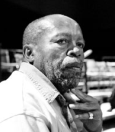
|
Steve
Bornfeld, Las Vegas Weekly, 28 June 2005. Photo by Keith
Shimada
He's not a traditional,
concept-driven director... He wants to know what we are,
for us to be the people who do the play, to use raw
materials we bring, rather than applying materials to us.
It was unsettling, but became so liberating, like flying,
soaring, sinking into some amazing Jacuzzi.
|
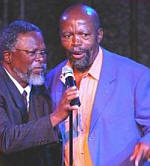
|
Naledi
Theatre Awards Ceremony 13 Feb 2005
A
moving highlight of the evening was the presentation of
"Life-Time Achievement Awards" to no less than
15 stalwarts of our SA stages: Lilian Dube, Smal Ndaba,
Phyllis Klotz, John Kani, Winston Ntshona, Fiona Fraser,
Wilna Snyman, Michael McCabe, Neels Hansen, Joyce
Levinsohn, Nomhla Nkonyeni, Dale Cutts, (who is
recovering from a recent stroke), returned exile, Zakes
Mokae, and a posthumous award to Dolly Rathebe, which was
accepted by her son.
|
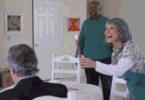 |
Ken White, Review-Journal, 7 Mar 2003
Interview
with the actors being directed by Mokae in Road to Mecca.
"Doing a Fugard play with Zakes Mokae is
nirvana... other people can talk academically about
Fugard, but Zakes developed Fugard's works with Fugard...
Mokae is a real actors' director....His approach is
organic."
|
 |
City Stages
News, March-April, 2003 About Road to Mecca.
Zakes is such a jolly fellow and has such deep
personal insights into the play and its relevance in
contemporary times, that it felt right to plan a 2003
production.
|

|
Erin
Auerbach, Las Vegas Mercury 20 Mar 2003
The Road to Mecca
Nevada Shakespeare Company
brings this vibrant character to life under Zakes Mokae's
thoughtful direction. In fact, the outstanding
performance just about overcomes some major flaws in the
over-indulgent playwriting, creating a satisfying evening
of theater...
There's a chaotic sense of two women at major
crossroads in their lives, which director Zakes Mokae
weaves together beautifully. Their impatience and
excitement around each other when Elsa first arrives
feels natural and brings out the potential in Fugard's
writing...
Luckily, the fluid direction saves the play and
makes you look at all that is beautiful about life, even
in the midst of all that's perilous in the world around
us. More importantly, you leave wanting to learn more
about Helen Martins, the sculptures she made, and why
creativity can often invoke fear and scorn rather than
praise and enlightenment...
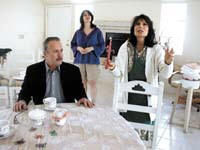
Photo by Ginger Mikkelsen
|
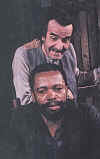 |
Pianosa Group
About the play Blood Knot.
Zach and Morris escape
into their game-playing and live in their dreams. But,
they ruefully admit, white South Africans "don't
like our playing games with their whiteness"; and,
they observe, if they ever want to arrest you, "all
they need for evidence is a man's dream's."
|
 |
Neon, Ken White, 12 Mar 1999
Mokae as stage director.
"No, no, I'm more into directing
now," says Mokae during a recent rehearsal. "I
leave acting to the actors. I've been acting for too
long. It makes sense for me now to move from acting to
directing."
He hedges a bit, saying
if a good role comes along he'll probably do it. But he
seems to have been bitten by the directing bug.
"It's about sharing ideas when you direct,"
Mokae says. "I like to work with actors. Being an
actor myself makes it easy."
What isn't easy is the
hard work that goes into preparing for a role. Mokae
likes to do a lot of table readings and pre-rehearsal
work before blocking the action and getting the play on
its feet. With the proper preparation, "when they
ask you questions in rehearsals, you're able to give them
an answer that is satisfactory to them," Mokae says.
"It's fun but it's a lot of work."
|
 |
Ken White, Las Vegas Review, 16 Aug 2002
(link has gone)
Mokae directing Bryan Harnetiaux´s play
National Pastimes.
Mokae
is quoted as saying: "It has something to say.. It's
about a guy who achieved what he wanted to achieve. For
me, apart from the politics, it was interesting because
baseball people really get involved in the sport."
|
 |
Ken White, Las Vegas Review, 18 Feb 2001
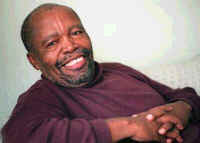 photo by Ken White. photo by Ken White.
There
are good actors here [Southern Nevada ]. But we need a
theater here and we need it badly," Mokae says.
To
that end, he is trying to establish what he calls the
Theater Lab, in which there would be not only
performances of a variety of material, but also workshops
in writing, acting and all aspects of technical theater
that he sees as a way to get younger people involved in
the arts.
It
requires a building for starters, which can be built or
an existing building renovated into a theater. Mokae has
been scouting for a location and seeking money to get the
company started. He figures it will take $250,000 to run
the company for the first year.
"It
just needs to be pushed a little," he says. "It
can be done."
|

|
Leonard
Greene, Boston Herald 4 Jun 1996
Memories of Cocky Two Bull Tlhotlhalamaje.
Tlhotlhalamaje
has spent more days than he can remember on Eloff Street.
When he was coming up with Hugh Masekela, Zakes Mokae and
a host of other South African performers, he spent
endless nights in jam sessions at the Dorkay House, South
Africa's answer to Harlem's Apollo Theater.
|
 |
Metro, 1995
In Seven Guitars.
"In another strong performance in an
exceptional cast, actor Zakes Mokae commands attention
with an intense conviction to character when ranting
about a mythical man who'll bring him riches, his dream
of owning his own plantation and an episode in which he
confesses to killing a man who made fun of his birth
name."
|

|
Iris Fanger,
Boston Herald 15 Sep 1995
Seven Guitars
Seven Guitars takes place in 1948, when three
musicians are trying to make their way from Pittsburgh to
Chicago to cut another record. But for their leader,
Floyd "Schoolboy" Barton, the sands of a
lifetime have run out.
The seven characters - the musicians, their women and a
mysterious neighbor - speak in an eloquent poetic
vernacular of the backyard where they come together. The
words that Wilson has given them carry both the resonance
of their heritage and the cadence of the blues, tangled
up in the longing of the spirit. These are people who
have done without for too long, and now their needs must
be considered. The dialogue is at once simple and
profound.
Keith David makes an edgy Barton; Zakes Mokae a
mesmerizing presence as Hedley, the Bible-chanting,
visionary figure of doom. When they sink more fully into
their roles, they will be Tony Award nominees for sure.
|
 |
TIME Domestic, 3 Jan 1994
(link has gone)
In The Song of Jacob Zulu.
A short reference "Yourgrau's play
about the making of a black South African terrorist was
raw but unforgettable in Eric Simonson's epic staging,
brought to Broadway by Chicago's Steppenwolf troupe.
K.Todd Freeman glowed in the title role, Zakes Mokae
excelled as several elders...".
|

|
Gerald
Weales, Commonweal 7 May 1993
A review of The Song of Jacob Zulu.
For the most part the characters lack depth,
are more types than individuals, and the brief scenes
that recount Jacob's growing involvement with rebellion
are little more than illustrative moments. These
limitations would be fatal to a realistic political play,
but that was never what playwright Tug Yourgrau intended
to write. He wanted a musical chorus of some kind and
that happily is what he got when Ladysmith Black Mambazo
joined Yourgrau and director Eric Simonson to create the
work at Chicago's Steppenwolf Theatre in 1992... In a few
cases--notably Zakes Mokae, who plays Jacob's austere but
loving father, the man who betrays him, and a strange
tramp-prophet who tries to persuade him to return to his
family---individual actors stand out from the company,
but for the most part they provide the setting for
Freeman's Jacob and Ladysmith Black Mambazo.
|
 |
Twentieth
Century Literature, Winter 1993 Are you
still working with Zakes Mokae?
Oh, yes. He called me from Los Angeles a few
days ago and left a message on my machine. Zakes is very
much part of my life. I've just spoken of celebrating,
and your question gives me a chance to share with you one
of the greatest celebrations I've ever had. Some
twenty-nine years ago, after an apprenticeship, I found
my voice and realized what sort of theatre I wanted to do
with a play called The Blood Knot. It involves two
characters, two brothers, one light-skinned, one
dark-skinned. Nobody wanted to do that play except me and
an actor called Zakes Mokae. Neither of us had much
theatre experience, but we sorted out the traffic, we
learned the lines, we got together a few props, and we
did that play in an attic space in downtown Johannesburg.
That was the start of it for Zakes and myself. And I had
this extraordinary experience, three or four years ago,
of being on a Broadway stage: the same play, the same
Zakes Mokae. In a business like theatre, which is not
known for the longevity of its relationships, the amount
of love that prevails among its practitioners, that
really was something. But then again, you see, so typical
of South Africa and its capacity to serve up paradoxes.
Yes, Zakes Mokae is and will always be a part of my life.
|
 |
Sheila
Fugard Twentieth Century Literature, Winter 1993
Nongogo
also gave Zakes Mokae his first real chance at acting. He
was to become an influence, especially when he played
with Athol in the ground-breaking The Blood Knot.
|
 |
Mary Benson
Twentieth Century Literature, Winter 1993
Immediately,
however, he had to decide whether to direct or to play
Boesman. In South Africa he had encompassed both, but in
London the strain might be too great. He chose to direct
Zakes Mokae, who had taken over the role from James Earl
Jones in the Off-Broadway production, would be Boesman,
freshly challenged by Athol's direction. Besides, Zakes's
blackness, and his performance potentially so different
from Athol's, would in turn challenge the white actress,
Yvonne Bryceland, a magnificent Lena in the South African
production.
|
 |
Gerald
Weales Twentieth Century Literature, Winter 1993
When
the play opened in Johannesburg, after its New York
premiere, Joseph Lelyveld compared the two Sams--Zakes
Mokae in New York and John Kani in Johannesburg.
"Mr. Mokae's Sam was a large and complex presence on
the stage, self-liberated and expansive. Mr. Kani's Sam
is taut and inward, strained when he laughs and never, it
seems, unmindful of the tense racial context." I
will have to take Lelyveld's description of Kani on
faith, but his account of Mokae's performance is accurate
enough--and yet not complete. The slightly chubby Mokae,
who danced with such grace at the beginning of the play,
moved with the same precision at the end, but with leaden
reluctance in his steps. "Little man you're
crying," the song says, and Vaughan is singing for
both Sam and Hally.
|
 |
Gerald
Weales Twentieth Century Literature, Winter 1993
Yet
at the same time Pogrund introduced him to a remarkably
talented group of people in Sophiatown, including Lewis
Nkosi, Bloke Modisane, Can Themba, Ken Gampu, and, most
important of all, an untrained bit-part film actor, Zakes
Mokae. Fugard cast Mokae as a township thug in No-Good
Friday, and then wrote the role of Blackie, Queenie's
crippled and violent hanger-on in Nongogo, especially for
him, and this, Fugard said, "was the start of one of
the really rich working relationships of my life"
(Benson "Keeping" 78).
Fugard and Mokae actually met through the nonracial
artists' equity association, the Union of South African
Artists--or Union Artists, as it became when it acquired
Dorkay House, the ex-clothing factory where township
talent was presented before mainly white audiences in
Johannesburg during the late 1950s. Johannesburg-born and
bred, Mokae had attended St. Peter's Anglican school in
Rosettenville, where he came to know the Superintendent,
Father Trevor Huddleston, on whom Father Higgins in
No-Good Friday was modeled, and who had formed a jazz
band to which Mokae, an accomplished tenor saxophonist,
belonged as a founder member (Hugh Masekela was another).
|
 |
ITDb
Cast
and production details various Mokae plays.
|
 |
Surfafel G,
AllAfrica
(link has gone)
An
interview of Leelai Demoz, who worked with Mokae on The Song of Jacob Zulu.
""I learned a lot from [Mokae] and
he liked what I did as an actor."
|
 |
Fences
Las Vegas Review-Journal
Director Zakes Mokae creates wonderful
pacing that carries the viewer through Troy's stumbles
and starts. He always remains true to the emotional core
of the work, letting the shared emotions communicate the
essence of the story, without resorting to theatricality.
Mokae also draws fine performances from Martha Watson,
Leain Vashon, Steven McKenzy, Cameron Miller and AnSherae
Devine.
|
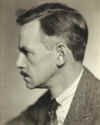
|
The Emperor Jones
which you can listen to for free over Internet.
With James Earl Jones and Zakes Mokae.
|